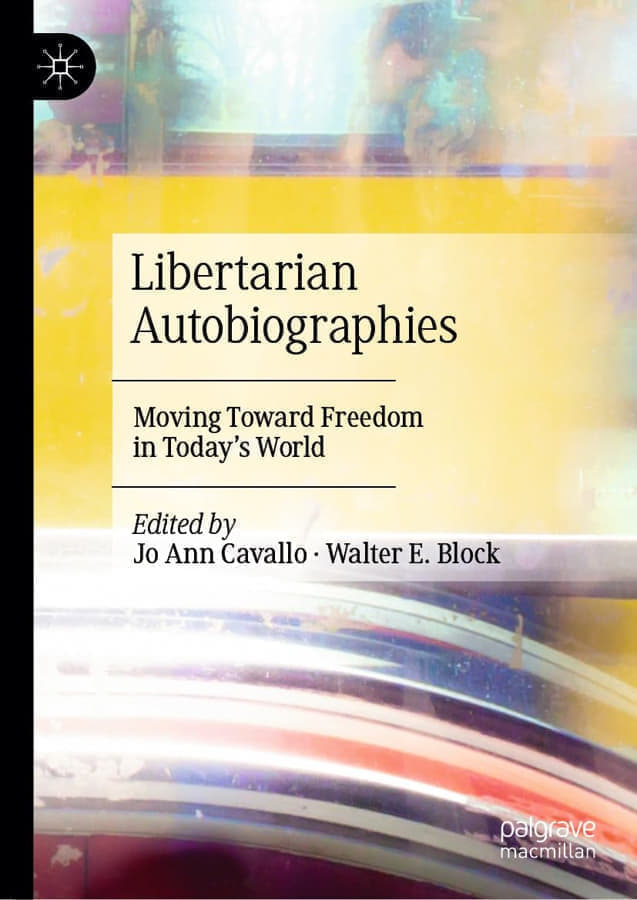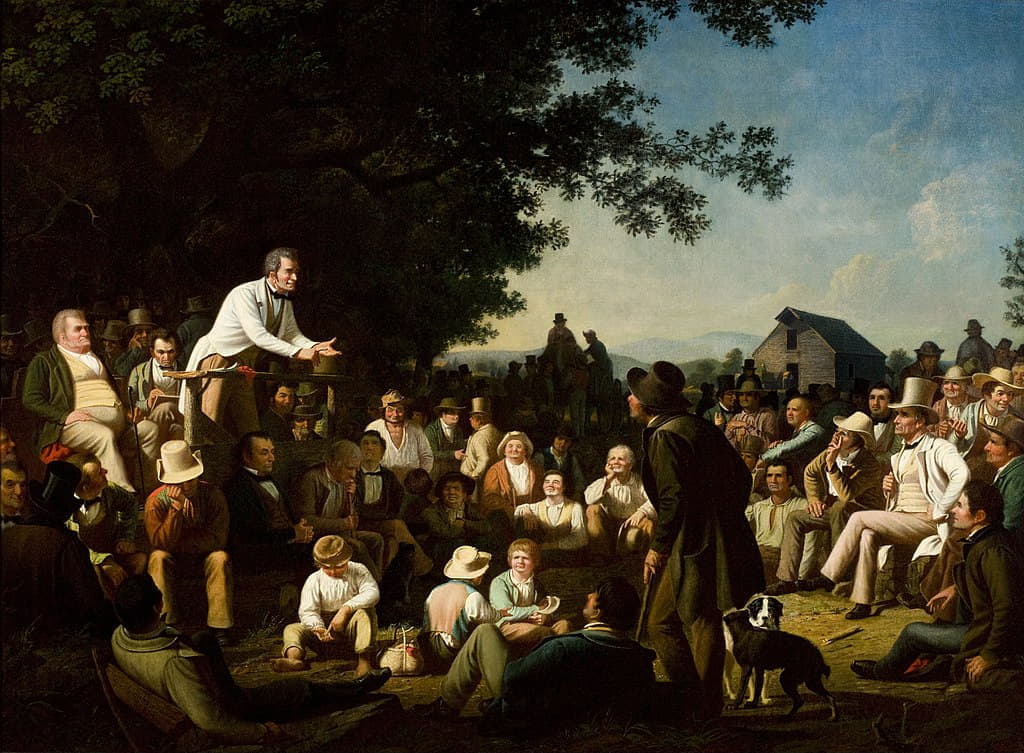A fundamental belief of libertarianism/liberalism [from “classical liberals” to anarcho-capitalists] is that there exists a certain human nature, the observation of which allows one to draw a certain objective conception of the “good life,” with that conception being seen as the only objective one possible, and the only possible, valid one. Also, the observation of human nature allegedly allows one to draw an objective categorical norm with regard to the right model for the positive law (with that categorical norm being seen as the only possible objective categorical norm, and the only valid categorical standard, as concerns the right model for the positive law); and objective instrumental standards for the purpose of the “good life.” Namely, moral ownership of oneself and of what one acquires non-violently as concerns the alleged objective categorical norm for the model of the positive law; rational and peaceful subsistence as concerns the content of the “good life;” and prioritized, peaceful pursuit of (material) subsistence, property, non-violence, responsibility, savings, mutual charity within the social division of labor as concerns the alleged objective instrumental standards for the purpose of the “good life.”
Another fundamental belief of libertarianism is that human conduct, while being not subject to any law as to its content (by reason of the alleged free will of humans), is nevertheless characterized by a number of laws as to its structure. Those laws are allegedly the object of what Ludwig von Mises called “praxeology;” and are allegedly apodictic. Thus completing—with an apologetic goal—praxeology with an investigation of the content of human action, Hans Hermann Hoppe endeavored to show that the experience of the type of human action that is argumentative action is necessarily the occasion for any human individual engaged in a given argumentative action to notice the existence of apodictic truths (i.e., that their terms are sufficient to render true, and which are therefore true by right and true whatever may be) in the domain of the knowledge of good and evil; and not only in the field of formal logic with the allegedly apodictic laws that are notably identity, non-contradiction, and the excluded third.
The Claim Of The Non-Aggression Principle’s Apodicticity
In addition to coming as an outgrowth of praxeology, Hoppe’s thesis intends to complete, or even replace, the jusnaturalist libertarian defense of the categorical principle of non-aggression, i.e., the defense of the categorical principle of non-aggression as a law that allegedly lets itself be deduced from human nature. While a loophole of libertarian jusnaturalism lies in its violation of the logical impossibility of deducing a categorical imperative (for instance, the principle of non-aggression) from an alleged state of affairs (for instance, human nature such as libertarianism represents it to itself), Hoppe’s thesis intends to fill that gap. And to prove the purported objectivity of the principle of non-aggression despite the impossibility of deducing an ought (in a categorical sense) from an is, i.e., without trying to deduce a categorical ought from an is.
According to Hoppe, in substance, the moral law non-aggression (i.e., the categorical principle that every man is the sole moral possessor of himself and of the goods which he acquires peacefully, and that no one is therefore morally entitled to showing violence towards someone, his integrity or his property acquired without violence) takes on the character of an apodictic truth just like the logical laws in the first-order logic (i.e., identity, non- contradiction, excluded third party, etc.). The performative contradiction that Hoppe judges to be necessarily associated with the contestation of the principle of non-aggression is alleged to endow the principle of non-aggression with a character of apodictic truth, i.e., to render the principle of non-aggression true by its sole terms, true whatever may be, true by right.
It is worth specifying that in first-order formal logic, the criterion necessarily retained to judge the apodicticity of a proposition consists of knowing whether it is tautological (i.e., true for any distribution of the values of truth), the laws of first-order logic serving as laws followed and assumed by the calculation of truth values. The incremental criterion contingently retained consists of knowing whether a proposition is reducible to a tautology via relations of synonymy, that second criterion being contingent in that it is conditioned on the recognition of those propositions, reducible (to tautologies) as being propositions themselves tautological.
Likewise, it is worth specifying that at least two modes of performative contradiction are conceivable. On the one hand, the act of acting in such a way that one proves in spite of oneself that one considers to be false some statements one however makes at the moment of the concerned action. On the other hand, the act of acting in such a way that one proves in spite of oneself the falseness of statements which one however makes at the same time. At last, it is worth specifying that the categorical form in a categorical statement—whether it is a moral law (for instance, the non-aggression principle) or a logical law (for instance, the identity principle)—does not endow such statement with an objective or apodictic character.
The Hoppean Fallacy
Hoppe’s argument in favor of the alleged apodicticity of the categorical principle of non-aggression, an argument known as “the ethics of argumentation,” does not consist of undertaking to prove the tautological character of the non-aggression principle or its reducibility to a tautology. Instead, it consists of affirming that the fact of displaying an argumentation for (or against) a given thesis necessarily supposes subscribing to the principle of non-aggression; and that the performative contradiction in the first above-evoked sense (i.e., in the sense of the saying of words that contradict the beliefs that the conduct accompanying those same words supposes and manifests) associated with any argumentation against the non-aggression principle proves, in spite of itself, the aforesaid principle’s apodicticity.
Those two assertions are false. On the one hand, far from the fact of displaying an argumentation necessarily supposing that one adheres to the principle of non-aggression, such an activity can very well suppose (for example) that one agrees as an Arian to listen to (and dismantle) the pro-Trinitarian arguments of his slave; but that one does not recognize him as having the right to express himself again on that subject (once the conversation is over), let alone quietly leave the palace to which his servitude attaches him. On the other hand, a performative contradiction (in the above-evoked sense), whatever it is, never proves that the belief one reveals in spite of oneself through the conduct consisting of contradicting that belief (or accompanying the fact of contradicting it) is true, even less apodictic. It only proves that there is an adherence to the aforesaid belief (whose true or false character remains to be determined).
Even if, indeed, the fact of engaging in some argumentation necessarily implied adhering to the principle of non-aggression, that assumption would only amount to believing (in spite of oneself) in the truth of the principle of non-aggression, not to proving (in spite of oneself) the aforesaid principle’s apodicticity. To put it in another way: even if the principle of non-aggression were necessarily a belief underlying any argumentative activity (and therefore, were necessarily be a premise, secret or avowed, of the statements held within the framework of some argumentative activity), the fact of arguing against the principle of non-aggression would only amount to inferring conclusions, contradicting the premises that one reveals in spite of oneself when drawing those conclusions. That would not render apodictic (i.e., true by their sole terms, true whatever the reality, true by right) the aforesaid premises.
A Variation Of The Hoppean Argument—And How It Is Fallacious As Well
Another attempt to prove the non-aggression principle, inspired by the “ethics of argumentation,” consists of invoking the second mode of performative contradiction: namely the fact of adopting a behavior such as to prove the falsity of statements one makes at the very moment of the aforesaid conduct. While it is no longer a question here of proving the alleged apodicticity of the non-aggression principle, the offered argument is nevertheless not less unsatisfactory than is the attempt to demonstrate the aforesaid apodicticity. The argument in question consists of asserting that the fact of arguing against the non-aggression principle, therefore the property of oneself, is an action that mobilizes, if not the voice or a pen, at least the mental abilities; and which, like any action, proves that one is in possession of one’s own body (including one’s brain). That relation of possession allegedly proving, in turn, that any suffered aggression is immoral—given it undermines the aforesaid possession of oneself.
Here again, each of these two statements is false. The fact of acting only shows that an order is given to the body (and executed), and not that the aforesaid body finds itself to belong to the aforesaid order’s author. (We will leave aside whether the author in question merges with the brain, the nervous system, or the soul). As for moral possession, i.e., the entitlement to be the possessor of a given good, therefore to hold it (and use it) without suffering any coercion, does not derive from factual possession as such (i.e., the actual possession of a good regardless of whether or not one is entitled to possess it), nor from the earliest factual possession (i.e., the fact not only of owning a given good, but of being the first to own the good in question). Even if a human (or another animal) were actually the factual possessor—and a fortiori the first factual possessor—of his own body, the aforesaid factual possession would in no way imply moral possession; therefore an entitlement not to be subjected to violence nor to a deprivation of liberty.
The act of arguing against the principle of non-aggression does not reveal the alleged moral possession (or even the alleged factual possession) of oneself any more than it does reveal the aforesaid principle’s alleged apodicticity. More generally, the moral possession of oneself is not more ascertainable or provable than the principle of non-aggression is apodictic. The fact of observing human nature, taken or not from the point of argumentative action, does not more allow us to notice the alleged moral (or even factual) possession of oneself any more than the principle of non-aggression is reducible to a tautology, or than the contingent presupposition of the principle of non-aggression in any argumentation attacking the truth of the aforesaid principle confers on the aforesaid principle an apodictic character.
That is just as true for the laws of first-order logic: the fact of observing reality does not more allow us to notice the ontological counterpart of the aforesaid logical laws (including the alleged necessity for any entity considered in a given respect at a given moment to be what it is rather than what it is not) than their contingent presupposition in any argument attacking the truth of the aforesaid logical laws does confer on the aforesaid logical laws an apodictic character. They are only assumed—rather than true by their terms alone or demonstrated.
Two Expected Objections
An objection from a proponent of “the ethics of argumentation” may be that the laws of first-order logic—just like tautologies (i.e., propositions remaining true for any distribution of truth values) or propositions reducible to tautologies—are indeed apodictic; nevertheless, insofar as the aforementioned laws are objectively evident by themselves (and only insofar as they are objectively evident by themselves). Whereas tautologies and propositions reducible to tautologies are apodictic insofar as they are demonstrable as true for any distribution of truth values (and only insofar as they are demonstrable as true for any distribution of truth values). And whereas the reducibility of propositions effectively reducible to tautologies may consist, for those propositions, of being reducible insofar as their terms are synonymous, but also of being so insofar as they are likely to be revealed via a performative contradiction, i.e., likely to be the object of an adhesion likely to get revealed in spite of oneself via a performative contradiction.
Another objection may be that the laws of first-order logic—identity, non-contradiction, excluded third, etc.—are certainly assumed (rather than demonstrated or true by their sole terms), and that they are assumed, if not by any argumentative activity, at least any senseful argumentative activity; but that denying the apodicticity of the aforesaid laws, or one of the propositions which those laws suffice to render true, is precisely senseless for our reason, insofar as those laws are a necessary condition of any senseful argumentative activity. Just like it is allegedly senseless for the reason to deny the apodicticity of the principle of non-aggression, insofar as the prior supposition of that principle is a supposedly necessary condition, if not of any argumentative activity, at least any senseful argumentative activity.
That ultimate argument in favor of holding the non-aggression principle and the laws of the calculus of predicates as apodictic does not pretend to prove their alleged apodicticity. It proposes that we act as if they were apodictic, i.e., proposes that one conventionally holds them as apodictic; and that, on the grounds that they are allegedly necessary conditions for any senseful argumentative activity. (In other words, that argument proposes that the first-order logical laws and the moral law of non-aggression be held to be apodictic conventionally rather than sincerely, i.e., by convention rather than conviction. It happens, nevertheless, that the same argument, which can be qualified as performative, is mobilized in favor of sincerely holding as apodictic the first-order logical laws and the moral law of non-aggression. In that case, the fact that those logical and moral laws allegedly come as necessary conditions of any objectively senseful argument allegedly proves that those laws are objectively apodictic).
How Performative Contradiction Is Not Tantamount To Tautology
Regarding the previous argument, the fact of adhering conventionally or sincerely to the laws of first-order logic (also called the calculation of predicates), i.e., the fact of holding them to be true by convention or by conviction, does not imply one adheres sincerely or conventionally to the idea that performative contradiction is a criterion of reducibility to a tautology.
Whereas the propositions that first-order logic is necessarily led to consider as true propositions by the operation of laws alone are the sole tautological propositions (i.e., true for any distribution of truth values), the propositions that first-order logic is contingently led to consider also as true propositions by the only operation of the logical laws include only those propositions reducible to tautologies via synonymy. Those propositions which are revealable via a performative contradiction, but which are neither tautological nor reducible to a tautology, are necessarily excluded outside the propositions that the calculation of predicates is necessarily or contingently likely to consider as true propositions by the sole operation of the logical laws.
To put it in another way, the revealability of a given proposition via a performative contradiction (i.e., via an action which proves that one implicitly adheres to that proposition even though one is in the process of denying it at the time of said action) does not render that proposition reducible (to a tautology) any more than it renders it tautological. Given that only a proposition reducible to a tautology is contingently conceivable as tautological (within the framework of first-order logic), and given that a proposition revealable via performative contradiction is not necessarily a proposition reducible to a tautology, performative contradiction cannot be a criterion of apodicticity in first-order logic: neither necessarily nor contingently.
Or again, adhering to the laws of first-order formal logic necessarily implies adhering to the idea that the tautological character of a proposition is a criterion of its apodictic character, and contingently implies (i.e., implies in the case where we admit that a proposition reducible by synonymy to a tautology is also render tautological by the sole fact of its reducibility) of adhering to the idea that the characteristic of a proposition to be reducible to a tautology is an additional criterion for apodicticity. Nevertheless, it does not imply adhering to the idea that performative contradiction is a criterion for apodicticity—and that, given that a proposition revealable through performative contradiction is not rendered reducible to a tautology by the sole fact of being revealable through performative contradiction.
Or again, in the eyes of the first-order logical laws, the fact of articulating a given statement (for instance, the negation of the non-aggression principle) while acting in a way that reveals one subscribes to the opposite of such statement only amounts to, simultaneously, expressing (verbally) a thing and (behaviorally) its contrary. It does not amount to proving the apodictically true character of the statement behaviorally expressed. The joint fact of expressing verbally the negation of the non-aggression principle and subscribing behaviorally to the non-aggression principle does not more render the non-aggression principle apodictically true than it proves the wrongness or the truth of the non-aggression principle. Expressing (verbally) p and (behaviorally) non-p does not more prove the wrongness or the truth of non-p than it renders p apodictically true. It only amounts to expressing two things excluding each other.
(As for the idea that the laws of first-order logic are self-evident: introspection allows us to see that those laws are not self-evident nor seem to be self-evident. The fact of being seemingly self-evident is, instead, a characteristic of what can be called the alleged ontological counterpart of said laws, i.e., a characteristic of the alleged ontological facts that are, for example, the impossibility for a given entity not to be what it is in a given respect and at a given time).
The Conventional Character Of Logic Laws
Regarding the argument that the moral law of non-aggression and the logical laws of first-order logic (i.e., identity, non-contradiction, excluded third, etc.) are both necessary conditions for an argumentative discourse which be genuinely senseful, and that it is therefore senseless to deny their apodicticity (despite the fact that said apodicticity is neither provable nor self-evident), the laws of first-order logic and the principle of non-aggression admittedly have in common that they claim to be the necessary conditions for an argument that makes sense. But precisely, the fact that an argument makes sense in the opinion of the laws of first-order logic only proves that it makes sense in the opinion of said laws: just as the fact that an argument makes sense in the opinion of the principle of non-aggression (in that it supposes and respects the categorical imperative to refrain from the slightest coercion towards the interlocutors and towards anyone) only proves that it makes sense in the opinion of said principle.
The fact that the laws of first-order logic or the principle of non-aggression serve as necessary conditions for arguments which are meaningful in their opinion does not imply that they serve as necessary conditions for argumentations which be objectively senseful. An argument which supposes a formal logic refusing all or part of the aforementioned laws will make sense in the opinion of the own laws of its own formal logic, which will not prove that it is objectively senseful: just like the fact that an argumentation assuming other categorical imperatives than the principle of non-aggression makes sense in the opinion of its own moral presuppositions does not prove that it is objectively meaningful.
It is worth pointing out that (convinced or conventional) adherence to the idea of the apodictically true character of the laws of first-order logic does not imply adhering (sincerely or conventionally) to the idea of the apodictically true character of the principle of non-aggression (and vice versa); and that the sincere (rather than conventional) adherence to the idea of the objectively true character of the laws of first-order logic is, sometimes, both motivated by the two reasons Aristotle proposes for sincerely adhering to the (idea of the) objective truth of the logical laws of identity, non-contradiction, and excluded third. Reasons that are performative (i.e., the laws in question are, in Aristotle’s opinion, necessary conditions for a senseful argumentation, what allegedly renders them apodictic) and ontological (i.e., the laws in question are, in Aristotle’s opinion, also founded by their ontological counterpart: for example, any entity, according to the respect considered and the moment considered, is necessarily what it is rather than what it is not).
Finally, one cannot but notice the failure of the performative argument in favor of the idea of the insane character of rejecting (by convention or conviction) the apodicticity of the laws of the first-order logic, or the law of the non-aggression principle, i.e., the argument consisting of pointing out the alleged necessity to assume (by convention or by conviction) both the laws of first-order logic and the principle of non-aggression so that an argument be objectively senseful.
It makes perfect sense to believe that the conformity of a given argument to the principle of non-aggression does not render the aforesaid conformity objectively senseful. Just like it makes perfect sense to believe that the conformity of a given argument with the laws of first-order logic does not render the aforesaid conformity objectively senseful; or to believe that the objectively senseful character of conformity to the laws of first-order logic—if it were attested—would not prove the objectively senseful character of conformity to the principle of non-aggression.
Beyond Aristotle And Rudolf Carnap
In practice, the performative argument in favor of holding conventionally or sincerely as apodictic the laws of first-order logic is sometimes accompanied by an ontological argument in favor of holding them (sincerely, and only in a sincere mode) for apodictic, which consists of pointing out the alleged ontological counterpart of the laws of identity, non-contradiction, and excluded third middle; and of justifying on the basis of said ontological counterpart the fact of sincerely holding them as apodictic. It also happens that, quite simply, one takes for the alleged apodictic character of the aforementioned laws what is actually the apparent self-obviousness of the ontological counterpart of said laws.
In both cases, the alleged ontological counterpart of the aforesaid laws would render said laws true by their conformity with reality (rather than true by their terms alone). It would not justify considering the aforesaid laws to be apodictic truths: whether by conviction or by convention. The alleged ontological counterpart is itself unfounded: given it is quite simply induced from a certain characteristic common in things and people in the field of reality which is offered to our senses (more precisely, the field immediately offered within what, in reality, is available to our senses). Namely, the characteristic of being necessarily what one is (i.e., the ontological counterpart of the principle of identity); of being necessarily incapable of being both what one is and what one is not at a given moment and in a given respect (i.e., the ontological counterpart of the principle of non-contradiction); and of being necessarily constrained to be either something or something else, but not both simultaneously, in a given respect and at a given moment (i.e., the ontological counterpart of the principle of the excluded third).
Since an induction is not a valid inference, it is wrong to generalize such characteristic to all the entities that inhabit reality on its various stages. Given the human mind is capable of conceiving the Trinity (which necessarily violates the laws of non-contradiction and of the excluded third), or the included third in quantum mechanics (with the fact for a photon of being simultaneously a wave and a particle, or for an electron of occupying two distinct positions simultaneously); it is nevertheless able (to a certain point and only in some people) to extract itself from those logical laws in order to try to apprehend the nature of the entities inhabiting other floors of reality.
To the Aristotelian thesis that the logical laws of identity, non-contradiction, and the excluded third have a not less performative foundation (i.e., they are allegedly the necessary conditions for a senseful discourse, from what it supposedly follows that they are apodictic) than ontological (i.e., they are allegedly based on the impossibility for a given entity to be both what it is and what it is not in a given respect and in a given moment, etc.), incidentally respond the following Carnapian remarks. Namely, that it is “a sure sign of a mistake if logic has need of metaphysics and psychology—sciences that require their own logical first principles;” and that in logic, “it is not our business to set up prohibitions, but to arrive at conventions,” Rudolf Carnap explaining, in this regard, that “prohibitions can be replaced by a definitional differentiation” and that “in many cases, this is brought about by the simultaneous investigation (analogous to that of Euclidean and non-Euclidean geometries) of language-forms of different kinds—for instance, a definite and an indefinite language, or a language admitting and one not admitting the Law of Excluded Middle.”
For our part, we defend a synthetic position. Namely that the principles of formal logic are admittedly conventional and that they, admittedly, cannot be proven ontologically; but that while coming as strict convention (instead of serving as objective criteria of what is objectively senseful or insane among the conceivable modes of argumentation), they are nevertheless confrontable with the noticed or soundly conjectured reality, which corroborates them (in default of confirming them objectively) and allows their gradual improvement as they are objectively refuted.
We believe the same applies to moral principles: at least those instrumental (rather than the categorical moral principles), including those designed for the purpose of a “good, viable” life in society. Whereas the categorical moral principles cannot be put to the test (since what is can neither confirm nor invalidate what must be categorically), the instrumental moral principles are confrontable with the reality observed or reasonably conjectured, which is able to refute them and help their enhancement (and even, perhaps, able to confirm them for some of them).
As regards more particularly the rules of law (among the instrumental moral principles effectively contributing to the “good life” in society), we believe that the Aristotelian jusnaturalist approach—ignoring the muddy, chimerical conceptions of a reason folded in on itself and endeavoring to identify, more modestly, the normal rules of law, functional with regard to the natural order (as a scrupulous observation reveals it and as a solidly corroborated imagination guesses it), and those which transgress the order of nature—is transposable and adaptable to a cosmos subject to intra-species biocultural evolution and inter-species biological evolution. It is true that liberalism lays claim to the observation of human nature to prove the alleged objectivity of its categorical ethical principle for the shaping of law (i.e., the categorical moral law of non-aggression), as well as of his conception of the “good life” and of the instrumental ethical principles associated with it. But the idea that it has of human nature is a fantasy and owes nothing to observation or to solidly corroborated imagination. We will come back to that subject elsewhere.
The Fallaciousness Of The Hoppean Criticism Of Logical Empiricism
In addition to his vain pretension to demonstrate the objectivity and the apodicticity of the categorical principle of non-aggression, and his most complete hermetism with regard to a jusnaturalist approach which be properly of Aristotelian obedience, Hoppe is mistaken on logical empiricism. And makes unjustified accusations against the Vienna Circle, the idea he has of the latter coming as a straw man.
The Hoppean argument against logical empiricism (presented in his article “Austrian rationalism in the age of the decline of positivism”) consists of presenting as self-contradictory the claim that any proposition is either a contentless, analytically true proposition, or a synthetic, empirically true proposition, or a normative proposition—so that the knowledge of the world can have no apodictic basis. And the claim that knowledge is always hypothetical to the point that experience can never have any value when it comes to assessing our theories. It turns out that each of two claims is neither self-contradictory nor attributable to the Vienna Circle’s logical empiricists. The first claim implicitly conceives of itself as a synthetic proposition, what is fully coherent with the tripartition it proposes. As for the second claim, it implicitly supposes that it comes as an exception to the rule it formulates: hence it escapes self-contradiction as well.
While the notion that analytical truths are contentless is, indeed, characteristic of the Vienna Circle, the latter nonetheless believed that logical laws served as an apodictic foundation for science. While Wittgenstein (who was not intellectually, institutionally affiliated to the Circle) conceived of the analytical truths as exhibiting the structure of the universe, in default of being endowed with signification, it seems to us that neither Rudolf Carnap nor any other member of the Circle came to endorse the view that analytically true propositions (such as “a bachelor is unmarried” or “two plus two makes four”) served as factual statements. The fact still remains that they did not reject the idea of an apodictic, a priori foundation for science as Hoppe claims. As for the idea that experience is wholly impotent regarding the confirmation of knowledge, it is not more characteristic of the Viennese empiricism—whose research agenda was precisely to show how experience could assess in probabilistic or instrumentalist terms the truth of a scientific statement.
That said, Carnap would come to conceive of formal logic in conventionalist terms. While Karl Popper would come to dismiss induction and to conceive of experience as able only to weaken our theories—and Willard Van Orman would come to dismiss the distinction between analytical and synthetic truths and to conceive of experience as unable to confront our propositions taken in isolation. The Vienna Circle’s project, i.e., the project of establishing the reducibility of meaningful statements to science and the reducibility of any scientific proposition to an empirically testable proposition, was admittedly a failure. But that project had nothing to do with the Hoppean description of the aforesaid project.
Praxeology In The Misesian Sense
Along with jusnaturalism in the Rothbardian or Randian sense, evolutionism in the Hayekian sense, or the Hoppean claim of the non-aggression principle’s apodicticity, praxeology in the Misesian sense constitutes one of the mirages of contemporary liberalism—about which one can say that one of its wrongs is to prefer the illusions of Ludwig von Mises to the clairvoyance of Vilfredo Pareto. Unwittingly, sociology in the Paretian sense addresses and demystifies each of the major axes of Mises’s theoretical edifice.
Praxeology in the Misesian sense, not content with claiming to elaborate propositions a priori true (in the sense of being true by reason of their sole terms), intends to focus exclusively on the structure of human action—and to deduce, progressively, its theoretical corpus from the sole proposition that humans act (in the sense of giving oneself ends and of choosing and using means with regard to the aforesaid ends). Besides, it denies the existence of human instincts and therefore their interference with human action (be it the determination of ends or the choice and handling of means), apart from an alleged instinctual effort of the part of every man to achieve the idea he has of greater happiness.
While denying, in that regard, that the field of the “sociology of instincts” (what, nowadays, would rather be called “sociobiology” or “evolutionary psychology”) can have any relevance, Mises envisages what he calls the “categories” of human action (i.e., the structures inherent in any particular human action) as the fruit of biological evolution in a context of selection by the natural environment. Thus, he paradoxically anticipates what is the fundamental credo of evolutionary psychology as it stands: namely the computational theory of the human mind, i.e., the theory that the human mind is fundamentally composed of “modules” dedicated to information processing, anchored into the human brain, and selected over the course of our species’ genetic evolution.
When it comes to the constitution of human civilizations, Misesian praxeology considers the division of labor as the most fundamental of social bonds: the very cement of society (what does not mean that it denies the rest of social ties, but that it recognizes a secondary place for them). As for the idea that Misesian praxeology has of progress, it notably sees in it the enhancement of the social division of labor (and of the human mutual aid operated within it) via the development of economic institutions (including money)—and via the substitution of “cooperation through contractual bonds” to “cooperation through hegemonic bonds.”
Misesian Praxeology’s Epistemological Claims—And Their Fallaciousness
Since none of the methodological claims of praxeology in Mises’s sense are realistic, none can prove compliant with the actual approach of Mises or his followers. Admittedly, it seems, the facts pertaining to the structure of human action—for instance, the successive assignment of a subjectively homogenous good’s acquired units to less and less priority objectives—are self-evident by reason of the nature of those very facts. But that apparent self-obviousness is precisely an attribute of those discovered facts (which, nonetheless, become self-evident only once they have been discovered and described); not a property of the proposition describing them. If one subscribes to first-order formal logic, the latter is not an apodictic proposition either—given it cannot be reduced to a tautology in the sense of first-order logic, i.e., a proposition which remains true whatever the distribution of truth values.
As for the discovery of the structural facts pertaining to human action, introspection allows us to notice that the discovery process admittedly requires deduction (notably from the proposition that men act); but that deduction is far from being sufficient for the aforesaid process and that a supplement of observation and intuition is both possible and indispensable for it. Most often, the Misesian praxeologist’s inquisitive mind only gives, a posteriori, a hierarchized, axiomatic-deductive presentation to the theories it previously acquired (via inculcation, intuition, or observation), what amounts to assembling the previously discovered pieces of a dispersed puzzle.
The methodological principle that praxeology (and therefore economics as a branch of the latter) only deals with the structure of human action is just as disproven via the examination of the theoretical propositions subsumed by praxeology (at least, in its Misesian version). Outside the praxeological edifice’s most fundamental propositions (such as the assertion that any engaged action tries to select the most suited means and endeavors to substitute a more satisfactory state of affairs to a less satisfactory one), praxeology and economics actually deal with the content of (the different types of) human action: especially the content of the type of human action known as entrepreneurship.
Why Pareto (And Not Mises)?
Sociology in the Paretian sense sets itself the implicit goal of covering both the structure of human action (with Pareto’s distinction between actions that are logically structured and those with an illogical structure) and its content, Pareto endeavoring notably to identify the nature of the instinctual “residues” which dictate—often surreptitiously—human ends, as well as the means mobilized for those ends; and that very often generate “illogical actions.”
While Mises conceives of praxeology as a strictly deductive approach whose starting point merges with the sole affirmation that man acts (in the sense of pursuing ends and mobilizing means), Pareto conceives of the study of human action as “logico-experimental,” that is to say, it is focused exclusively on observation and induction. Both converge as concerns the idea that human actions are not necessarily logical and that they sometimes—especially as a result of reasoning processes disoriented by emotion—adapt improperly the choice (and use) of means to the pursued ends.
Mises nevertheless limits himself to identifying rationality’s instrumental function (i.e., the function of determining the respective content of ends and means), while Pareto proposes a more extended analysis of rationality which identifies—in addition to the instrumental function of rationality—a concealment function, which consists of developing fictitious justifications for our illogical acts with the idea of passing off them as coherent. Besides, Mises, quoting Ludwig Feuerbach on that occasion, denies human instincts (and their incidence in human action) apart from a general “instinct of happiness,” while Pareto, thus anticipating sociobiology, imputes human emotions—and the illogicality they do not fail to introduce into our actions—to a web of instincts that we share very widely with animals.
Apart from the methodological pretensions, Pareto is quite superior to Mises on each of the above-mentioned points: Pareto’s only naivety is to believe that the effective methodology of his “sociology” is strictly “logical-experimental,” while the involved process mobilizes intuition and deduction as much as induction. As we have noted above, Mises’ pretension to resorting exclusively to deduction (from the sole assertion that man acts) is not less chimerical—himself coupling actually deduction with induction, as well as with intuition.
Let us add that, unlike Mises, in whose eyes the effect of any economic law is strictly independent of the social context of economic actions, Pareto rightly points out that economic laws—while remaining absolute—see the interdependence between economy and (the rest of) society countering the effect of those very laws. Protectionism thus causing a recomposition of political and industrial elites for the benefit of those individuals the most gifted to encourage the nation’s industrial development, what potentially compensates for the loss income linked to protectionism. Besides, Mises mistakenly imagines the social division of labor, and therefore economic facts, to be the only cement of society, and therefore the most fundamental social fact of all; while Pareto not less lucidly remarks that in addition to the social division of labor, the cement of society also includes, at least, the juridical hierarchical order within which the struggle for political preeminence is constantly being played out.
Yet another cleavage relates to the possibility for human action to create a world leaving behind it the interindividual (or interstate) struggle for physical power and the associated expropriation. Pareto admittedly recognizes a slow progress in the direction of a greater rationality of human actions—in the senses of greater objectivity in knowledge of the world, and greater skill in the choice and the use of means. An impression which emerges from his work is nonetheless that the “cycle of elites” capturing physical power and expropriating the good of others constitutes in his eyes a timeless trait of human societies.
For his part, Mises has the naivety to believe possible, if not inevitable, the entry of humanity into an era in which men will have abandoned the quest for physical power (including political) and in which the violence of states will subsist only to protect persons and their goods (and to chastise assassins and thugs). Thus, he stands at the midpoint of the millennialist hopes of his anarchist heirs (including Murray Rothbard), who believe to be feasible and even inevitable the coming entry of humanity into an era in which states themselves will have disappeared, the protection of persons and goods finding itself henceforth taken charge of by organizations without a coercive monopoly.
Conclusion—And Clarifying Natural Law And Quantum Physics
The revealability of a proposition via a performative contradiction (in the sense of the saying of statements that contradict a proposition whose endorsement is both supposed and manifested by the action accompanying the saying of those statements) is not equivalent to a tautological character nor equivalent to the reducibility to a tautology, i.e., a proposition true for any distribution of truth values in first-order logic. Just like the fact of conforming to certain logic laws or certain moral laws in a given argumentation intended to debunk those very laws does not render them apodictic. Hoppe’s case for the apodicticity of the non-aggression principle, i.e., the principle that no one is entitled to exert coercion toward someone or his non-violently acquired property, is not less fallacious than is his pretension to align the positive legal rules with a categorical, objective norm.
Basically, Hoppe does not better understand natural law (i.e., law based on nature) than do liberal jusnaturalists—even though he avoids the fallacious deducing of an ought from an is. Natural law should not be understood as apodictic, nor should it be understood as an objective categorical principle serving as a universal model for positive law. Natural law is admittedly objective; but it is neither categorical, nor distinct from positive law, nor applicable to the individual (taken independently of society), nor totally universal, nor discoverable a priori. Instead, it comes as a certain modality of positive law: namely those of positive legal rules which effectively contribute to the survival and functionality of a given society in view of the biocultural specificities of that society; but also in view of human nature (as it has been made by biological evolution) and in view of the cosmic order in which any human society takes place.
In other words, natural law is a hypothetical rather than categorical norm. It serves as an imperative required for the survival and functionality of a given society (in intergroup competition). Far from being external to positive law or applicable to the individual taken independently of society, it is only applicable to society and serves as positive rules of law effective for the success of a given society in intergroup competition. Besides, it is partly universal, partly circumstantial. It is universal when it comes to those positive rules of law which, to contribute to the success of society (in terms of survival and functionality), take into account human nature or the cosmic order. It is circumstantial when it comes to those positive legal rules which, in order to contribute to the success of society (in terms of survival and functionality), take into account the biological specificities of a given society or the cultural traditions of said society. Those same traditions finding themselves constrained to take into account human nature, cosmic order, and the biological specificities to ensure the success of said society (in terms of survival and functionality).
Natural law is not discovered via conjectures independent of experience. Instead, reason discovers it—imperfectly—via careful and comparative observation of the different human societies; as well as via the identification of the functional societies and those dysfunctional (as concerns their rules of law) and via the connection of functionality (and dysfunctionality) to cosmic order and to human nature such as observation and solidly corroborated imagination allow us to conceive them. In a sense, the same applies to logical laws—namely that they are not discovered via a priori, independent conjectures (i.e., conjectures which are both independent of experience and independent of science), but via conjectures both confronted to the experienced reality and to the scientifically, solidly conjectured reality. In that sense, Quine’s epistemological holism, i.e., the claim that experience only confronts a theoretical edifice (from its logical laws to its protocol sentences) taken as a full-fledged unit, is true.
As for praxeology such as devised and bequeathed by Mises, it is inept for many reasons: including its apodictic pretension; its rejection of the interference of instincts with human action; its frivolous treatment of the difference between rational and irrational actions (which ignores Pareto’s residues and derivations); its ignorance of the interdependence between economic and social facts; or its laicized millennialism. But also, its restriction of the field of action (i.e., the field of behaviours defining and deciding to reach some goals, and determining and using some means for those goals) to human beings alone.
Instead of action being unique to conscious beings (and a fortiori humans), quarks, atoms, bacteria, and the cosmos itself (taken as a whole) have made decisions and acted long before the onset of consciousness—as our friend Howard Bloom says in essence. A particle takes decision about the selection and the realization (via quantum decoherence) of one of the different states it simultaneously maintains—just like a homo sapiens when acting selects and realizes one of the possible futures of his action. And just like the cosmos itself has been deciding at each incremental level of emergence—starting with the emergence (known as inflation) which saw the cosmos going from nothingness to immensity and accomplishing a primordial decoherence, i.e., a primordial decision as to the one of the simultaneous states which would be retained.
Grégoire Canlorbe is an independent scholar, based in Paris. Besides conducting a series of academic interviews with social scientists, physicists, and cultural figures, he has authored a number of metapolitical and philosophical articles. His work and interviews often appear in the Postil.
The featured image shows, “La récolte des pommes à Éragny (Apple harvest at Eragny),” by Camille Pissarro, painted in 1888.












